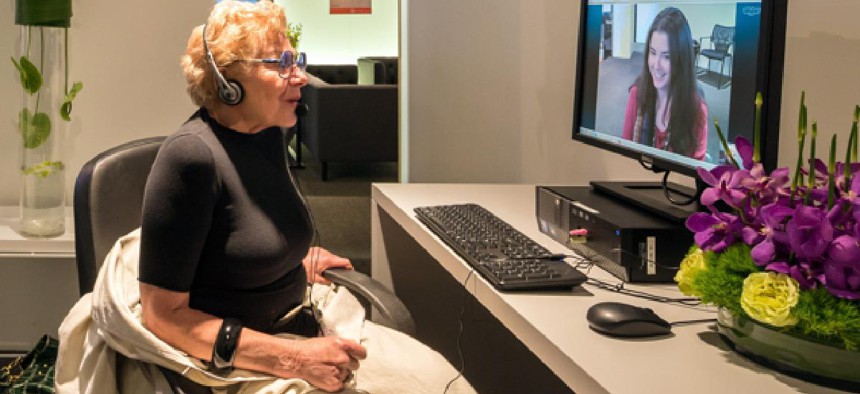Older Adults Technology Services: Bridging the intergenerational internet gap

Online access is becoming an even more critical part of modern life for older adults – with communication between doctors and patients increasingly relying on the internet and more and more updates from family members and friends commonly being shared primarily online. Yet computer literacy is still elusive for about half of Americans over age 65, and only 25 percent of seniors earning less than $30,000 annually have access to broadband at home, according to a 2013 survey by the Pew Research Center.
With the cohort of older New Yorkers at 1.3 million and rising, the need for relevant training is only growing. But by providing free workshops in lower income areas of the city, Older Adults Technology Services (OATS), a nonprofit with a budget of $3 million, 37 locations throughout the city and a staff of 31, has created a model that since 2004 has linked over 20,000 of the city’s most vulnerable older residents to the internet.
“The days of playing bingo at the senior center are numbered,” said Thomas Kamber, the founder and executive director of OATS and a professor of philanthropy and social entrepreneurship at Columbia University.
Kamber is also a member of both the Mayor’s Broadband Task Force and the Age-Friendly New York Commission. It was 12 years ago when he gave an 80-year-old friend computer lessons and based on that success founded OATS. Its affiliate website, Senior Planet, has the tagline “Aging with Attitude.” Senior Planet serves as a forum for a burgeoning audience. It offers features on health and travel and profiles of trendsetting older adults and gets an estimated 135,000 hits per month.

In 2013 the success of the website spurred Kamber to open a brick-and-mortar Senior Planet Exploration Center. He chose a location in Chelsea due to its proximity to multiple subway lines. “I also looked for a space on the retail level so that it is welcome to walk-ins,” he said.
Last year 2,500 New Yorkers, 35 percent of them traveling from the outer boroughs, stopped by the center for courses or information. The flagship location and its satellite in Plattsburgh provide spaces where older adults can feel comfortable acquiring the skills to “remain relevant in the workplace, access tools for managing health and … follow new avenues for lifelong learning.” All of this activity is due to word-of-mouth, OATS’ sole form of outreach, since Kamber believes it “forces us to deliver value.”
In the early days Kamber set up shop in Bedford-Stuyvesant, a site that continues to thrive and impress him with its progress. The organization has since expanded to all five boroughs, and has even trained staff members in branches of the New York Public Library to conduct workshops. This summer, City Councilman Vincent Gentile allocated funds for OATS to conduct free computer classes at Fort Hamilton Senior Center in Brooklyn.
“Ninety percent of our sites are located in lower income areas,” Kamber pointed out. Workshops are always free and although its mission is to support those in need, “we never turn anyone away – and we do accept donations no matter how small,” he added.
“Digital equity is an issue, and our free workshops are designed to bring parity to this growing segment of society,” Kamber said. Predictably, the courses fill up quickly.
OATS is the largest program in the nation dedicated to offering free technological support to an older demographic, Kamber said. While senior centers and libraries offer labs and workshops, “No other nonprofit has a curriculum that runs 3,000 pages, with a full-time developer, available in four languages, that is specifically tailored to instructing people over 60,” Kamber said.
Kamber refers to OATS users as “change agents” in an effort to promote an image of older people as vital and creative and counter the stereotype that they are frail and incapable. “It’s important to convey the richness of experience in the energy of those New Yorkers over 60 who are deeply active in the community, who are making a contribution and are part of the equation rather than a repository of need,” he observed. “We all have to address the issue of ageism, which is at the root of many of society’s problems,” he said.
Always seeking organic ways to grow and serve the OATS community, this year Kamber launched Team Senior Planet – a pet project with a cohort of 40 members. This workout program requires participants to wear a loaned Fitbit activity tracker and “Team Senior” T-shirt while fulfilling their commitment to work out three times a week. Predictably, team spirit buoyed the group to adhere to the protocol. Based on results, OATS hopes to expand the workout model to as many as 20 city locations.
Kamber is also proud of a collaboration with Capital One that has resulted in an online education project which advises OATS members on how to avoid online fraud. “Our association with Capital One is a testament to the private-public partnership model,” he said. OATS has also partnered with other corporate partners like Time Warner and Verizon. “It’s encouraging that these firms have invested in our model,” he said.
Kamber finds keeping up with the economy to present the greatest challenge to OATS. “We want to attract and retain the best quality staff, which means the salary we offer is competing with the private sector,” he reflected. “The onus is on us to explain why OATS is the best choice. Sometimes it’s tough to make the pitch when we can’t offer a pension. But I’m confident that if OATS appeared on a game show panel, the contestant would always choose OATS because of our mission: Working with older people is awesome.”
NEXT STORY: $2B Housing Fund inches forward